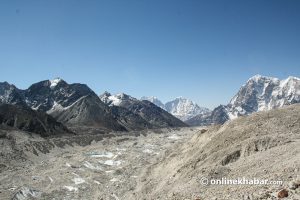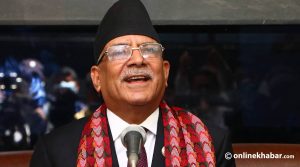
Dubai, December 7
During a session at COP 28 held in Dubai, a panel discussion titled Building Blocks of Climate Ambition: People, Nature, and Action brought together representatives from various sectors, including government and non-government organisations, development partners, the private sector, community-based organisations, indigenous communities, and women’s groups.
During the session organised by the National Trust for Nature Conservation (NTNC) at COP 28, Chief Guest Birendra Prasad Mahato, Minister for Forests and Environment, highlighted Nepal’s resilience and stressed the necessity for global cooperation in confronting the challenges posed by climate change.
Mahato talked about the importance of comprehensive policies and their effective implementation. He spoke on the importance of global cooperation to address challenges transcending political boundaries, considering financial constraints and capacity gaps.
“The NTNC has done a great job of reinforcing nature-based solutions at the grassroots level. We now need increased financial resources to strengthen climate actions,” he said.

Development Management Expert, Popular Gentle Bhusal, serving as an advisor to Prime Minister Pushpa Kamal Dahal, outlined nature-based solutions as strategic actions to tackle societal challenges, including climate change. He stressed the dual benefits of these solutions, contributing to both human well-being and biodiversity.
NTNC is currently executing a Green Climate Fund (GCF)-funded project titled ‘Improving Climate Resilience of Vulnerable Communities and Ecosystems in the Gandaki River Basin.’ This seven-year initiative by the Ministry of Forest and Environment aims to mainstream and operationalise a sustainable river basin approach for watershed management. The project focuses on building climate resilience for both vulnerable communities and ecosystems in the Gandaki River region.
Secretary of the Forest Ministry, Deepak Kumar Kharal, shared insights into the ministry’s efforts, stressing the importance of inter-ministerial coordination, engagement with parliament, and collaboration with the Prime Minister’s office.
“Specific measures included allocating resources for nature-based solutions, collaborating with environmental organisations, and implementing a robust monitoring and evaluation system,” he said.
Roj Nath Pande highlighted climate change’s recognition as a national priority in the Federal Parliament of Nepal. He stresses parliamentarians’ commitment to integrating climate considerations into policies, plans, and actions.
Bapon Fakhruddin, Water and Climate Leader at the Green Climate Fund discussed the GCF’s role in aligning global interventions with local actions for nature-based solutions, highlighting the need for external finance in developing countries.

Claudia Godfrey Ruíz, Committee Chair of CPDAE-GCF/Adaptation Fund, highlighted the crucial role of the Direct Access Modality in promoting country ownership of climate projects. She shared insights from ongoing implementations and stressed the importance of aligning projects with national priorities.
During the Closing Remarks, NTNC Member Secretary Sharad Chandra Adhikari expressed gratitude to participants, highlighting the discussions’ significance in contributing to collective climate initiatives. She emphasised the need for effective solutions and collaboration, acknowledging diverse approaches discussed and expressing confidence in the shared smart ideas.
As the session concluded, a call to join hands and work collectively for meaningful climate actions resonated, setting a hopeful tone for future endeavours in the face of climate challenges. The commitment of Nepal and the global collaboration showcased during this panel discussion underscored the urgency and importance of addressing climate change on a united front.
The session was moderated by NTNC head of Climate Manish Raj Pandey.























